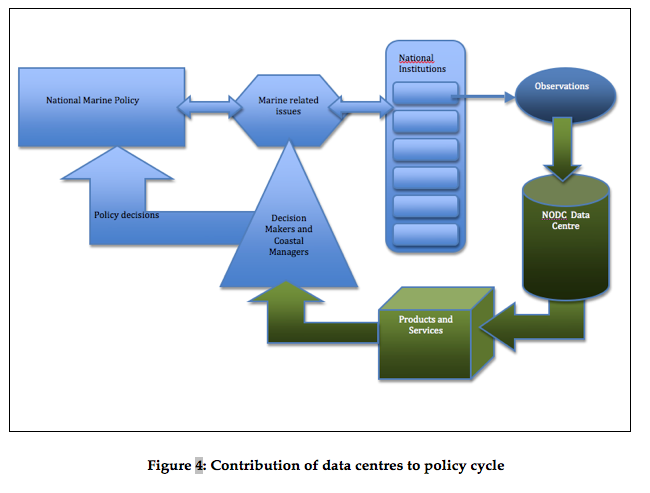As indicated in 4.1 ODINAFRICA-IV will strongly focus on assisting decision-makers towards the sustainable management of marine and coastal resources. This will require strong national coordination and integration.
 Figure 4 shows the possible cycle that includes the NODCs. In this model there will be several national institutions that contribute data or metadata. These may be oceanographic institutions, national census, environmental protection agencies, fisheries institutions, etc. The data of many of these may be managed by the NODC. The NODC, in close consultation with the data originators, will develop products and services that will be provided to the decision-makers who will make policy decisions based upon these products and services. Decision-makers will also identify or respond to environmental issues that then generate the need for additional observations, which will be made by the national institutions.
Figure 4 shows the possible cycle that includes the NODCs. In this model there will be several national institutions that contribute data or metadata. These may be oceanographic institutions, national census, environmental protection agencies, fisheries institutions, etc. The data of many of these may be managed by the NODC. The NODC, in close consultation with the data originators, will develop products and services that will be provided to the decision-makers who will make policy decisions based upon these products and services. Decision-makers will also identify or respond to environmental issues that then generate the need for additional observations, which will be made by the national institutions.
One of the main tasks of ODINAFRICA-IV will thus be to promote the establishment (through relevant high level government officials and departments) of National Coastal and Marine Coordination Committees. These will bring together all relevant stakeholders relevant to the policy cycle shown in Figure 4 (or any other equivalent policy cycle related to coastal and marine policy).
The 19 participating countries are: Algeria, Angola, Benin, Cameroon, Congo, Egypt, Ghana, Kenya, Madagascar, Mauritania, Mauritius, Mozambique, Namibia, Nigeria, Senegal, South Africa, Tanzania, Togo and Tunisia.
Note: the project also provides for 6 additional “slots” for countries that were not able to commit themselves yet but are studying their possible participation, and/or new countries.
Continue to "Assessment of the partner institutions"